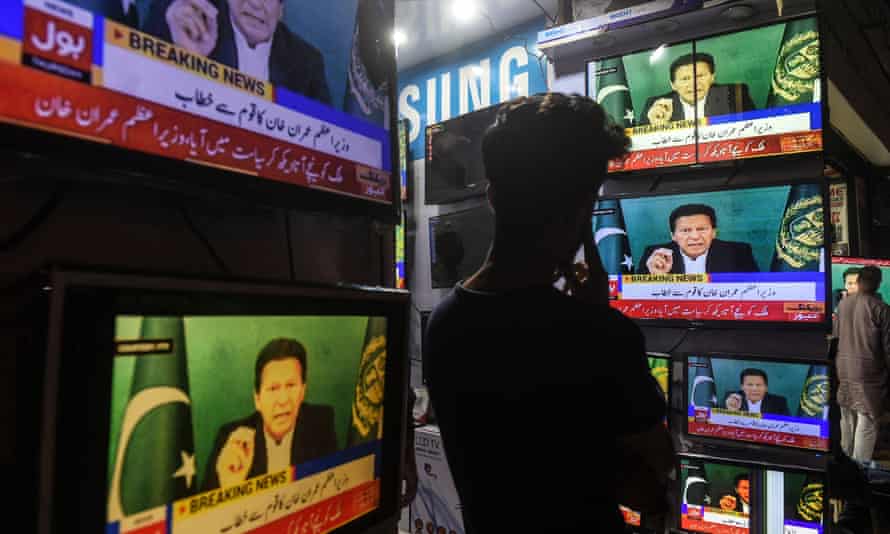Imran Khan promised us press freedom in Pakistan. Now journalists are under attack
I’ve been taken off air and others have been beaten up. Why is the prime minister not standing with us?
 |
Hamid Mir-Wed 2 Jun 2021
Once upon a time, Imran Khan and I used to fight for press freedom together in Pakistan. In November 2007, when then military ruler General Pervez Musharraf imposed a state of emergency and banned me from appearing on television, Khan was among the few politicians who stood by me. I took my popular political talkshow on to the streets of Islamabad, where large crowds would come and hear us speak live, and Khan was a regular guest. “When I become prime minister,” he promised, “journalists will have true press freedom.”
Now I have been taken off the air once again, but this time Khan is the prime minister. The ban came immediately after I spoke out at a protest for press freedom in Islamabad. Journalists, lawyers and civil society activists were there to show our solidarity with Asad Ali Toor, a journalist who was attacked last week inside his own home. Three men came in, tied him up, and beat him severely. The attackers, Toor said, identified themselves as being from the Inter-Services Intelligence agency.
In my speech at the protest, I delivered a warning to the attackers. If they continue to enter our homes and attack us, I said, we won’t stay quiet. I didn’t name any individual or organisation. This is the real tragedy of Pakistan today. The country is being run by unknown people. Everyone knows who they are, but no one dares identify them. From the shadows, they evade accountability.
Despite the presence of CCTV footage, which shows three men matching the description of the attackers entering Toor’s building, no one has been arrested. Instead, a smear campaign has been launched against him. He has been accused of faking the attack, despite the deep scars and bruises that mark his body. Some have claimed it was a “personal dispute”, that he had been attacked by his girlfriend’s brothers. Toor replied to the latter with a simple challenge: “If this is true, then arrest those brothers and prove me wrong.”
The attack on Toor was the latest in a long series of assaults on journalists in the Pakistani capital. In April, my former colleague Absar Alam was shot while walking in a park. In July 2020, Matiullah Jan was abducted for several hours. The government claims that Islamabad is the safest city in the country, but as the media watchdog Freedom Network Pakistan recently reported, it has become the most dangerous city for the country’s journalists.
The pattern is depressingly predictable. It is always critical and independent-minded journalists who are targeted. The attacks come after a series of threats. After the attack, the victim is accused of faking the incident to seek publicity or political asylum. Despite the evidence, the attackers are never caught. Instead, the victims are called traitors and even made to face new charges.
Since the attack, the Federal Investigation Agency, which routinely harasses journalists, has summoned Toor to answer new charges. Meanwhile, a journalist on a previously unknown newspaper has filed a complaint demanding that I be put on trial for treason. This isn’t the first time I’ve faced this situation. In 2014, I survived an assassination attempt after being shot six times. The doctors managed to remove four of the bullets. I still carry the remaining two inside my body. Two years earlier, a powerful bomb was discovered under my car. I have never received justice. Instead, I’ve been vilified for demanding it.
I decided to speak out last week because enough is enough. Over the past year, there were a reported 148 cases of threats and attacks against journalists. There is heavy censorship – including the beeping out of voices, shows suddenly taken off the air and channels mysteriously disappearing from screens. Online, there are vicious and coordinated cyberharassment campaigns.
When Imran Khan came to power, Pakistan was ranked 139th on the World Press Freedom Index. Now it stands at 145th. “Impunity for crimes of violence against journalists is total,” says Reporters Without Borders. Speaking on the BBC last week, the information minister, Fawad Chaudhry, comically claimed: “We probably have more free media than in the first world.” His own ministry has proposed a new law, the Pakistan Media Development Authority ordinance 2021, that would make the junta in Myanmar proud.
Under this law, all spaces for journalism would be subject to draconian provisions. A tribunal, appointed by the ministry and not the judiciary, would decide what can and cannot be said. Any content could be prohibited without notice or a hearing. Offenders would be punished by up to three years in prison and millions of rupees in fines. Banning me is just the beginning. There is a lot more to come.
When the management of Geo News called me to say they were facing pressure to take me off the air, I didn’t blame them. The channel’s owner, Mir Shakil-ur-Rahman, spent 241 days behind bars on what Human Rights Watch condemned as “politically motivated” charges. I do want to ask prime minister Khan if he remembers the promise he made to me 14 years ago. Will he stand with journalists now, as he did then, or will he take the side of the enemies of press freedom?
-
Hamid Mir is a Pakistani journalist and author


No comments:
Post a Comment
Note: only a member of this blog may post a comment.